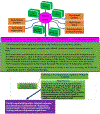Hypothesizing That Pediatric Autoimmune Neuropsychiatric Associated Streptococcal (PANDAS) Causes Rapid Onset of Reward Deficiency Syndrome (RDS) Behaviors and May Require Induction of "Dopamine Homeostasis"
- PMID: 36407790
- PMCID: PMC9670240
- DOI: 10.4236/oji.2022.123004
Hypothesizing That Pediatric Autoimmune Neuropsychiatric Associated Streptococcal (PANDAS) Causes Rapid Onset of Reward Deficiency Syndrome (RDS) Behaviors and May Require Induction of "Dopamine Homeostasis"
Abstract
Pediatric autoimmune neuropsychiatric disorders associated with group A streptococcal infections (PANDAS) is a concept that is used to characterize a subset of children with neuropsychiatric symptoms, tic disorders, or obsessive-compulsive disorder (OCD), whose symptoms are exacerbated by group A streptococcal (GAS) infection. PANDAS has been known to cause a sudden onset of reward deficiency syndrome (RDS). RDS includes multiple disorders that are characterized by dopaminergic signaling dysfunction in the brain reward cascade (BRC), which may result in addiction, depression, avoidant behaviors, anxiety, tic disorders, and/or OCD. According to research by Blum et al., the dopamine receptor D2 (DRD2) gene polymorphisms are important prevalent genetic determinants of RDS. The literature demonstrates that infections like Borrelia and Lyme, as well as other infections like group A beta-hemolytic streptococcal (GABHS), can cause an autoimmune reaction and associated antibodies target dopaminergic loci in the mesolimbic region of the brain, which interferes with brain function and potentially causes RDS-like symptoms/behaviors. The treatment of PANDAS remains controversial, especially since there have been limited efficacy studies to date. We propose an innovative potential treatment for PANDAS based on previous clinical trials using a pro-dopamine regulator known as KB220 variants. Our ongoing research suggests that achieving "dopamine homeostasis" by precision-guided DNA testing and pro-dopamine modulation could result in improved therapeutic outcomes.
Keywords: Borrelia; CANS; Dopamine Homeostasis; Group A Beta-Hemolytic Streptococcal (GABHS); Lyme; Molecular Mimicry; PANDAS; Pro-Dopamine Regulation; Reward Deficiency Syndrome.
Conflict of interest statement
Conflicts of Interest The authors declare no conflicts of interest regarding the publication of this paper.
Figures
Similar articles
-
The First Pilot Epigenetic Type Improvement of Neuropsychiatric Symptoms in a Polymorphic Dopamine D2 (-DRD2/ANKK (Taq1A)), OPRM1 (A/G), DRD3 (C/T), and MAOA (4R) Compromised Preadolescence Male with Putative PANDAS/CANS: Positive Clinical Outcome with Precision-Guided DNA Testing and Pro-Dopamine Regulation (KB220) and Antibacterial Therapies.Open J Immunol. 2024 Sep;14(3):60-86. doi: 10.4236/oji.2024.143006. Open J Immunol. 2024. PMID: 39507617 Free PMC article.
-
Pediatric Autoimmune Neuropsychiatric Disorders Associated with Streptococcal Infections (PANDAS).2016 Feb 10. In: Ferretti JJ, Stevens DL, Fischetti VA, editors. Streptococcus pyogenes: Basic Biology to Clinical Manifestations [Internet]. Oklahoma City (OK): University of Oklahoma Health Sciences Center; 2016–. 2016 Feb 10. In: Ferretti JJ, Stevens DL, Fischetti VA, editors. Streptococcus pyogenes: Basic Biology to Clinical Manifestations [Internet]. Oklahoma City (OK): University of Oklahoma Health Sciences Center; 2016–. PMID: 26866234 Free Books & Documents. Review.
-
Pediatric Autoimmune Neuropsychiatric Disorders Associated With Streptococcal Infections (PANDAS).2024 Aug 11. In: StatPearls [Internet]. Treasure Island (FL): StatPearls Publishing; 2025 Jan–. 2024 Aug 11. In: StatPearls [Internet]. Treasure Island (FL): StatPearls Publishing; 2025 Jan–. PMID: 39163422 Free Books & Documents.
-
Prevalence of pediatric acute-onset neuropsychiatric syndrome (PANS) in children and adolescents with eating disorders.J Eat Disord. 2022 Dec 13;10(1):194. doi: 10.1186/s40337-022-00707-6. J Eat Disord. 2022. PMID: 36514161 Free PMC article.
-
Pediatric Autoimmune Neuropsychiatric Disorders Associated with Streptococcal Infections (PANDAS): Myth or Reality? The State of the Art on a Controversial Disease.Microorganisms. 2023 Oct 13;11(10):2549. doi: 10.3390/microorganisms11102549. Microorganisms. 2023. PMID: 37894207 Free PMC article. Review.
Cited by
-
Neuroinflammation and pathways that contribute to tourette syndrome.Ital J Pediatr. 2025 Feb 28;51(1):63. doi: 10.1186/s13052-025-01874-3. Ital J Pediatr. 2025. PMID: 40022157 Free PMC article. Review.
-
The First Pilot Epigenetic Type Improvement of Neuropsychiatric Symptoms in a Polymorphic Dopamine D2 (-DRD2/ANKK (Taq1A)), OPRM1 (A/G), DRD3 (C/T), and MAOA (4R) Compromised Preadolescence Male with Putative PANDAS/CANS: Positive Clinical Outcome with Precision-Guided DNA Testing and Pro-Dopamine Regulation (KB220) and Antibacterial Therapies.Open J Immunol. 2024 Sep;14(3):60-86. doi: 10.4236/oji.2024.143006. Open J Immunol. 2024. PMID: 39507617 Free PMC article.
References
-
- Swedo SE, Leonard HL, Garvey M, Mittleman B, Allen AJ, Perlmutter S, Lougee L, Dow S, Zamkoff J and Dubbert BK (1998) Pediatric Autoimmune Neuropsychiatric Disorders Associated with Streptococcal Infections: Clinical Description of the First 50 Cases. American Journal of Psychiatry, 155, 264–271. 10.1176/ajp.155.2.264 - DOI - PubMed
-
- Zhang R, Manza P, Tomasi D, Kim SW, Shokri-Kojori E, Demiral SB, Kroll DS, Feldman DE, McPherson KL, Biesecker CL, Wang GJ and Volkow ND (2021) Dopamine D1 and D2 Receptors Are Distinctly Associated with Rest-Activity Rhythms and Drug Reward. Journal of Clinical Investigation, 131, e149722. 10.1172/JCI149722 - DOI - PMC - PubMed
Grants and funding
LinkOut - more resources
Full Text Sources

